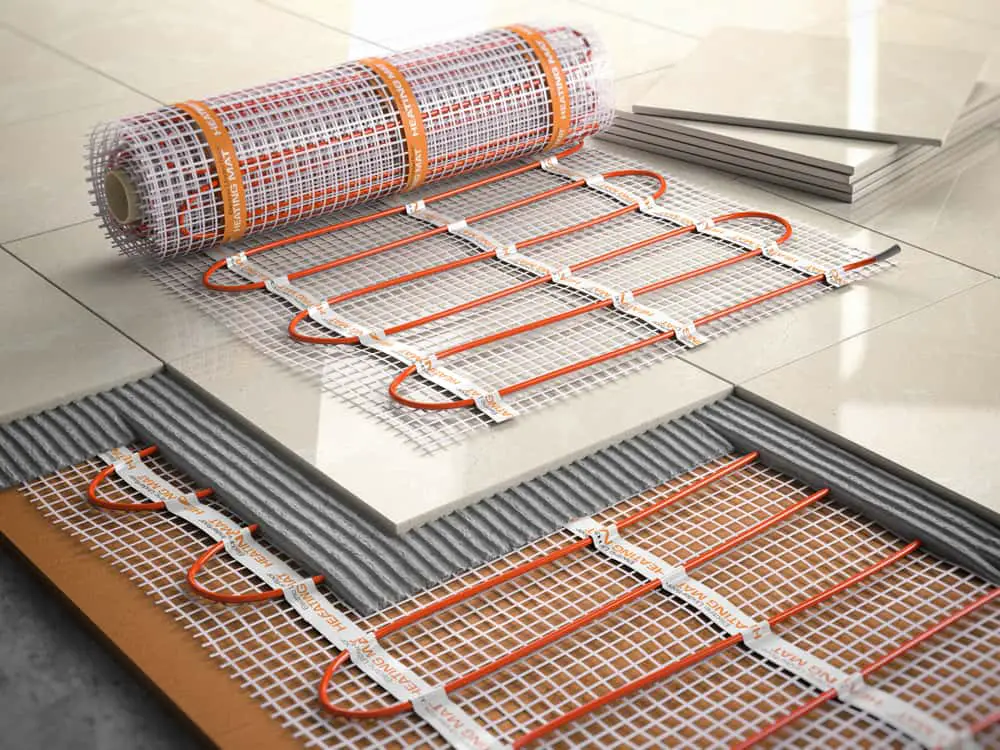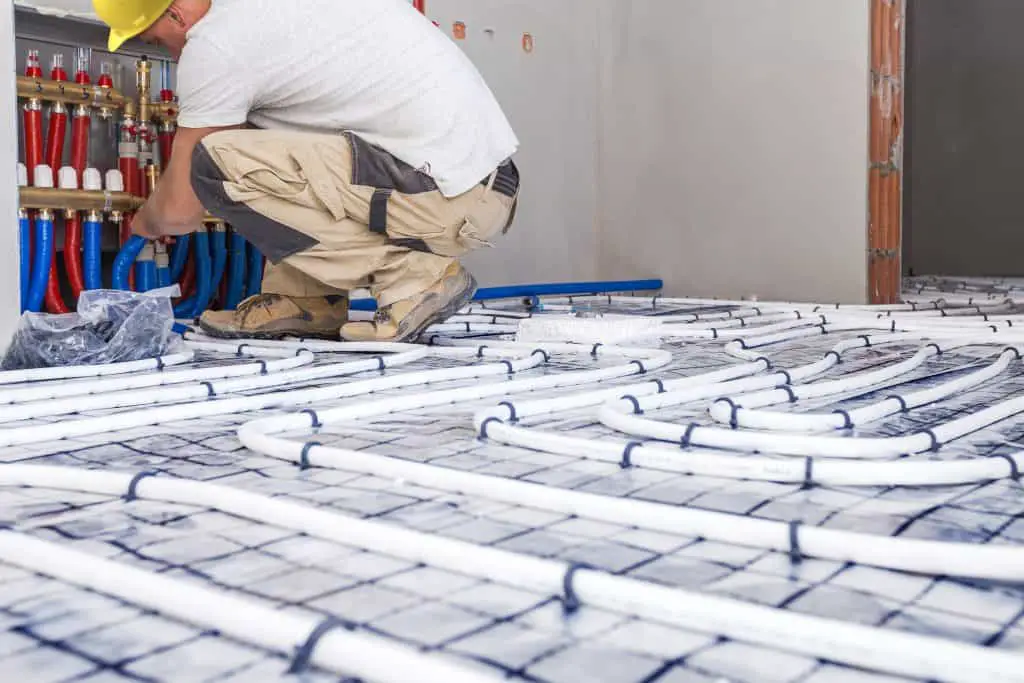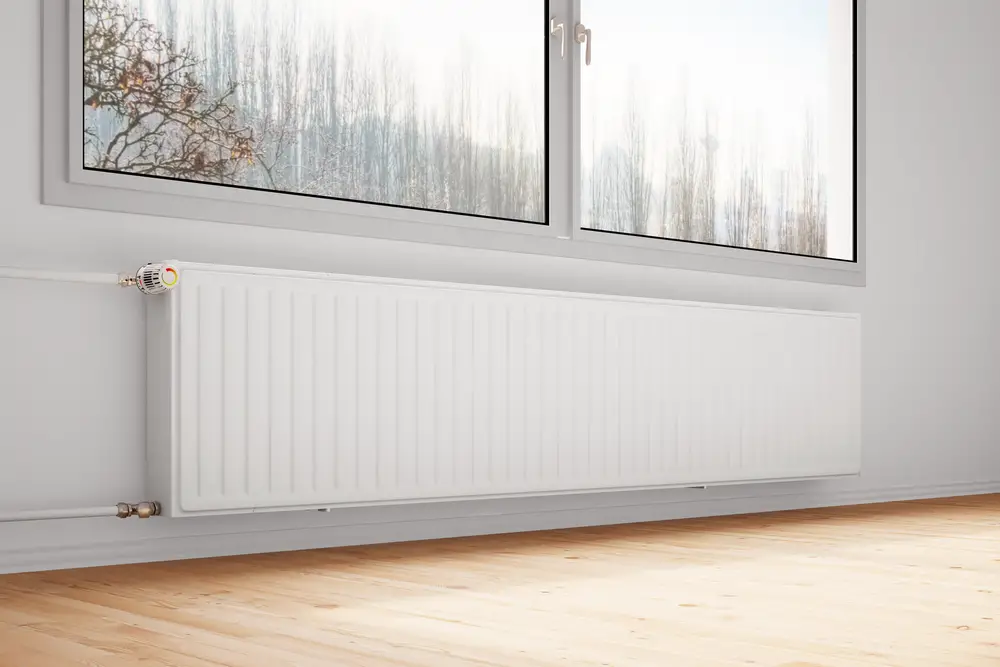The popularity of underfloor heating systems is on the rise, lovely warm floors and radiant heating are great features in the home. Conflicting information about the energy usage of underfloor heating is circulating on the internet, and that makes it hard for many people to make informed decisions.
The amount of energy used up by electric underfloor systems is dependent on their power rating. The amount of energy consumed by water underfloor heating is dependent on (but not limited to) the means of heating, the size of the room, and the run time.
The table below shows the energy consumed by electric underfloor heating systems and is based on a Thermonet EZ 150W/m² system and the average 2021 price tariff for electricity in kWh, which is 18.9p.
| No of Days | Energy Consumed for a 150W heating mat 8 hrs. daily, for a 10m2 space. (KWh) | Price (£) (Tariff @18.9p/KWh) |
| 1 | 12 | 2.27 |
| 5 | 60 | 11.34 |
| 10 | 120 | 22.68 |
| 30 | 360 | 68.04 |
| 180 | 2160 | 408.2 |
| 365 | 4380 | 827.8 |
If you are wondering how much energy underfloor heating uses, this post is for you. In this post, we are going to provide energy-efficient statistics for both water-based and electric underfloor heating systems and answer some frequently asked questions about underfloor heating in general.

The costs and energy uses discussed in this article are used for illustrative purposes only, based on the sources stated. You should enquire to your underfloor heating provider for up to date costs and energy efficiency as they are dependant on many factors including the energy efficiency of your home.
How much energy does water-based underfloor heating use?
Underfloor heating systems can run at low temperatures, often below 30 ℃. Therefore, these systems use significantly less energy than central heating systems that work with radiators.
The energy consumption of a water-based underfloor heating system mainly depends on your heating appliance. A 24 kW gas boiler will use more or less 24 kW of energy in an hour. If you keep this gas boiler running for 5 hours a day, the system will consume around 120 kW. This energy is enough to meet your entire home’s demand for heating and hot water, inclusive of your underfloor heating.
However, the energy use and efficiency of a water-based underfloor heating system is dependent on many factors, including the energy source (boiler, heat pump, etc), flooring choice, screed use, insulation, floor area coverage, and much more.
How much energy does electric underfloor heating use?
For electric underfloor heating systems, energy consumption is specified in W/m², which means watts per square meter. It refers to the amount of electricity used per hour if you leave the system running all the time.
According to Viessmann, for an average modern domestic home, a 100-150 W/m²/hr system should be sufficient. But what does a 150 W/m²/hr system mean? Well, it means that for every square meter of heat mat, around 150 watts of electricity is used per hour.
You can work out the costs of running the system by checking the price per kWh you are charged by your energy provider.

Electric vs Water Underfloor Heating Running Costs
Many people interested in underfloor heating wonder if these systems are expensive to run. While the installation cost is a bit steep, underfloor heating is significantly cost-effective in the long run.
For small spaces like kitchen refurbs or bathrooms, electric underfloor heating is a pretty good option. The running costs are determined by factors such as floor insulation, floor covering, room size, room insulation, frequency of use, and the price of electricity.
Let’s assume that you want to get an underfloor heating system installed in a kitchen measuring 14m². Let’s say 2m² out of this 14m² covers fixtures. So, subtract this 2m². Now you have 12m².
An additional 10% should be subtracted because the heating kit should not be too large for the room. Now we have 10.8m². The nearest available size is 10m², so you will have to invest in a 10m² electric underfloor heating system.
Based on the energy usage of the Thermonet EZ 150W/m² system, a 10m² system may cost around £2.27 to run for 8 hours a day. See the table at the top of this article for more example costs. You could calculate the example hourly cost by dividing the daily cost by 8 (28p/hr).
The costs and energy uses discussed in this article are used for illustrative purposes only, based on the sources stated. You should enquire to your underfloor heating provider for up to date costs and energy efficiency as they are dependant on many factors including the energy efficiency of your home.
In comparison, a water-based underfloor heating system is a lot cheaper to run. According to Nu-Heat—a Devon-based provider—the running cost of a water-based underfloor heating system is around a third of an equivalent electric underfloor heating system.

Is underfloor heating energy efficient?
Underfloor heating is efficient, in part because it turns the entire floor into a heat emitter that distributes heat evenly without overheating the room. According to Luciana Kola, marketing manager at Uponor, underfloor heating uses 15-40% less energy than radiators.
There are several key differences between underfloor heating systems and central heating systems with radiators. While underfloor heating systems produce radiant heat, radiators heat the air using convection.
Radiant heat maintains natural humidity but convection reduces humidity, making the area a bit stuffy. Radiators are prone to overheating but underfloor heating systems are not. A combination of these factors makes underfloor heating more efficient.
Water-based underfloor heating systems tend to be more efficient than electric systems because the latter are more expensive to run. Installing underfloor heating in a new building is more energy-efficient than installing one in an old building.
The efficiency also depends on the level of insulation the building has. Sufficient insulation reduces heat loss and makes underfloor heating more efficient.
Is underfloor heating expensive compared to other heating systems?
Given the relatively high installation costs, underfloor healing is initially more expensive than a typical central heating system. However, in the long run, underfloor heating can be less expensive—if your home is well-insulated.
As we have already stated, underfloor heating uses 15-40% less energy than radiators. When paired with a boiler, water-based underfloor heating is around 25% more efficient than radiators. The same system becomes around 40% more efficient than radiators when paired with a heat pump.
The running cost of an electric underfloor heating system is 3 to 4 times more than that of a water-based system, or a radiator system working with a gas boiler. This is simply because electricity is more expensive than natural gas.
So, the bottom line is, that water-based underfloor heating is usually cheaper than typical central heating systems, but electric underfloor heating tends to be more expensive.

Do you keep underfloor heating on all the time?
It is advised that you keep your underfloor heating system switched on constantly, particularly in the depths of winter. If you keep the system constantly turned on, it will warm up faster, and result in better levels of efficiency. However, keeping the system constantly switched on may not be necessarily cheaper, at least initially.
Underfloor heating is designed to run constantly. So, leaving the system switched on is not a bad idea. It will encourage faster warming up times and greater efficiency. That is why underfloor heating systems come with programmable thermostats. The thermostat will keep the system running at an even temperature and automatically change the settings as the weather changes.
An underfloor heating system can take up to three hours to warm up. If you entirely shut the system down, it will consume more energy to provide the expected heating. And this is the main reason why the system should be left running constantly.
However, there is a catch: if your house does not have good insulation, which is the case for houses built before the 1970s, leaving your underfloor heating constantly running may not be a good idea. Underfloor heating is efficient only if the house has good insulation.

Conclusion – Does underfloor heating use a lot of electricity?
Underfloor heating is an efficient alternative to traditional central heating systems that work with radiators. If an underfloor heating system is installed in a well-insulated house, the system is likely to use significantly less electricity than a traditional central heating system.
Underfloor heating is efficient in part because it turns the entire floor into a heat emitter. Rather than warming air, walls, and ceiling, radiant heat warms humans and objects and provides unrivaled comfort. While electric underfloor heating uses more electricity than water-based systems, both types are popular for their great efficiency.
As we have already stated, the efficiency of an underfloor heating system depends on how well-insulated the house is. Investing in a smart thermostat is highly encouraged because this device will relieve you of the burden of having to adjust the temperature settings manually. It will help you save a good sum on your heating bills.
The energy efficiency of this system is just one of the reasons why so many people are showing interest in underfloor heating systems. It works very well with both air source and ground source heat pumps that are getting wildly popular among environmentally conscious people.
If you think you need to get underfloor heating installed in your home, make sure you discuss the specifics with an experienced technician. A reliable provider can help you make informed decisions.
Lots more Underfloor Heating Information Here
- What Depth is Required for Underfloor Heating?
- Turning on Underfloor Heating for the First Time – How Long to Wait?
- Can you lay Vinyl flooring over underfloor heating?
- Do Tiles Crack With Underfloor Heating?
- Can You Heat a Whole House With Underfloor Heating?
- Can You Have Underfloor Heating Upstairs?
- Will Underfloor Heating Raise My Floor? – Underfloor Heating Layers Explained
- Can I put furniture on top of underfloor heating?
- How Do I Know If My Underfloor Heating is Leaking?
- Can You Combine Underfloor Heating With a Ground Source Heat Pump?
- Is Underfloor Heating Safe?
- Does Underfloor Heating Add Value to a Property?
- Can you have Wooden Floors with Underfloor Heating?
- Can Underfloor Heating Cause a Fire?
- What temperature should Underfloor Heating be set at?
- Can I Put a Rug Over Underfloor Heating?
- How Long Does it Take for Underfloor Heating to Warm Up?
- Why is my Underfloor Heating Noisy?
- Why is my Underfloor Heating Patchy?
- How do I know if My Underfloor Heating is Working? – Common Problems & Fixes
- What can go wrong with underfloor heating?
- Can you Combine Underfloor Heating with an Air Source Heat Pump?
- Do you keep underfloor heating on all the time?
- Does Underfloor Heating work with Smart Thermostats?
- Kitchen Underfloor Heating – Should Underfloor Heating go Under Kitchen Units?
- How much energy does Underfloor Heating use?
- Underfloor Heating in Summer and Winter
- Lifespan of Underfloor Heating
